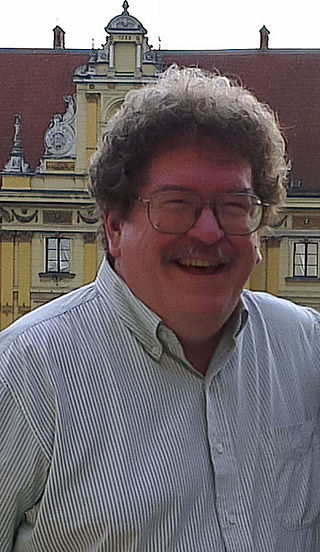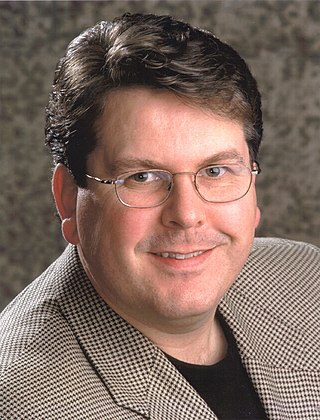Related Research Articles

Joan Tower is a Grammy-winning contemporary American composer, concert pianist and conductor. Lauded by The New Yorker as "one of the most successful woman composers of all time", her bold and energetic compositions have been performed in concert halls around the world. After gaining recognition for her first orchestral composition, Sequoia (1981), a tone poem which structurally depicts a giant tree from trunk to needles, she has gone on to compose a variety of instrumental works including Fanfare for the Uncommon Woman, which is something of a response to Aaron Copland's Fanfare for the Common Man, the Island Prelude, five string quartets, and an assortment of other tone poems. Tower was pianist and founding member of the Naumburg Award-winning Da Capo Chamber Players, which commissioned and premiered many of her early works, including her widely performed Petroushskates.
John Harris Harbison is an American composer and academic.

John Psathas, is a New Zealand Greek composer. He has works in the repertoire of such high-profile musicians as Evelyn Glennie, Michael Houstoun, Michael Brecker, Joshua Redman and the New Juilliard Ensemble, and is one of New Zealand's most frequently performed composers. He has established an international profile and receives regular commissions from organisations in New Zealand and overseas.
Václav Nelhýbel was a Czech-American composer, mainly of works for student performers.
David Sartor is an American composer, conductor, and educator, and is the founder and music director of the Parthenon Chamber Orchestra.

Eric Ewazen is an American composer and teacher.
Richard John Mills is an Australian conductor and composer. He was the artistic director of Victorian Opera from 2013-2023, and formerly artistic director of the West Australian Opera and artistic consultant with Orchestra Victoria. He was commissioned by the Victoria State Opera to write his opera Summer of the Seventeenth Doll (1996) and by Opera Australia to write the opera Batavia (2001).

Allan Gilliland is a contemporary Canadian composer.
John Mackey is an American composer of contemporary classical music, with an emphasis on music for wind band, as well as orchestra. For several years, he focused on music for modern dance and ballet.
Dan Welcher is an American composer, conductor, and music educator.
James Houlik is an American classical tenor saxophonist and saxophone teacher.
David C. Sampson is an American contemporary classical composer.

Sylvie Bodorová is a Czech composer. During a career spanning from the late 1970s to the present day she has composed a large number of works for various instruments, both solo and orchestral pieces, and produced commissions for cities, festivals and organisations around the world. She was a founder member of the Czech classical group Quattro, formed in 1996.
David Frederick Stock was an American composer and conductor.
Michael H. Weinstein is a Swiss composer active in America.
Frederick Charles Tillis was an American composer, jazz saxophonist, poet, and music educator at the collegiate level.
Kerry Turner is an American composer and horn player. Turner is a recognized name in the horn and brass industry. Turner’s major ensembles with whom he performs include the American Horn Quartet, the Virtuoso Horn Duo, and the Luxembourg Philharmonic Orchestra. Turner has performed internationally as a soloist and clinician. Turner also sings tenor in a semi-professional octet.
Andy Akiho is an American musician and composer of contemporary classical music. A virtuoso percussionist based in New York City, his primary performance instrument is steel pans. He took interest in becoming a percussionist when his older sister introduced him to a drum set at the age of 9. Akiho first tried his hand at the steel pan when he became an undergraduate at the University of South Carolina. He began taking several trips to Trinidad after college to learn and play music. From there, he started writing pieces of his own.
References
- ↑ "Obituary of Russell James Peck". Archived from the original on 2016-03-05. Retrieved 2013-01-07.
- ↑ "Reflection of Russell Peck - North Carolina NPR News".
- ↑ DRAM: Notes for "Russell Peck: Orchestral Works"
- ↑ "Detroit Symphony Orchestra - History of the DSO". Archived from the original on 2018-11-17. Retrieved 2013-02-21.
- ↑ SSO marches to beat of a talented drummer
- ↑ NewMusicBox » Commissioning Consortia: Banding Together in the Name of New Music
- ↑ WASHINGTON TALK: Briefing; Alabama Stars - New York Times
- ↑ http://nrcom.xnetweb03.nrinteractive.com/content/2009/07/27/article/emf_to_honor_composer_russell_peck#nrcAnc_Middle2_Jump [ dead link ]
- ↑ Sunday marks Gosling's finale as conductor | savannahnow.com | Savannah Morning News
- ↑ Toledo Blade - Google News Archive Search
- ↑ The Milwaukee Journal - Google News Archive Search
- ↑ Symphony presents: The Thrill of the Orchestra | The Sierra Vista Herald
- ↑ The News - Google News Archive Search
- ↑ "Archived copy" (PDF). Archived from the original (PDF) on 2013-06-30. Retrieved 2012-11-25.
{{cite web}}: CS1 maint: archived copy as title (link) - ↑ 5 MUSICAL WORKS ECHO NEW THEORY - Simultaneity Is Rally Point of Avant-Garde Program - Article - NYTimes.com
- ↑ Oklahoma State University Wind Ensemble Cave of The Winds Russell Peck